Caroline Leavitt's Blog, page 126
May 26, 2011
Yay, I published in Salon; Boo, the commenters hate me
I used to write for Salon all the time, and when recently, a Chinese edition of my novel, Girls in Trouble, appeared with the wrong author photo, I wrote about it for Salon. To me, it was an essay about how so much is out of our hands as authors and also about the meaning of ownership, how an author photo is a physical symbol of "this is who I am and I wrote this book."
You might have thought I was writing about starting WWIII.
I instantly had about 70 responses, and most of them were anonymous. I had posted up two photos, my real author photo and the photo of Summer Pierre, the woman whose picture festooned my book. "You look like a vampire who needs a tan," someone wrote. "You want to look mysterious, but instead, you just look like a big bitch." I was accused of being jealous because the other woman was prettier, warmer, less pale. Then commenters began attacking me for what they thought was navel-gazing, for being a hack writer, for having a website they didn't like where "each link opened to a new window!" The attacks grew bigger and bigger, the language nastier and nastier, right along with my headaches and nausea.
People did come to my rescue. "I was going to email you to warn you about the commenters we get," someone who worked at Salon told me. My editor there emailed to tell me, "they're all mostly wanna be writers and they get jealous. Don't take it personally." A few friends, who had published pieces in Salon, also wrote me, telling me the same vitriol had splashed over them, too. "Don't read any more," people begged.
I believe in karma. I didn't react. I stayed cool, but it was a really rough day for me. And then, half an hour ago, I heard the story had found its way to China. An award-winning radio show in Ireland emailed me, wanting to interview me.
Not bad for a "vampire who needs a tan."
You might have thought I was writing about starting WWIII.
I instantly had about 70 responses, and most of them were anonymous. I had posted up two photos, my real author photo and the photo of Summer Pierre, the woman whose picture festooned my book. "You look like a vampire who needs a tan," someone wrote. "You want to look mysterious, but instead, you just look like a big bitch." I was accused of being jealous because the other woman was prettier, warmer, less pale. Then commenters began attacking me for what they thought was navel-gazing, for being a hack writer, for having a website they didn't like where "each link opened to a new window!" The attacks grew bigger and bigger, the language nastier and nastier, right along with my headaches and nausea.
People did come to my rescue. "I was going to email you to warn you about the commenters we get," someone who worked at Salon told me. My editor there emailed to tell me, "they're all mostly wanna be writers and they get jealous. Don't take it personally." A few friends, who had published pieces in Salon, also wrote me, telling me the same vitriol had splashed over them, too. "Don't read any more," people begged.
I believe in karma. I didn't react. I stayed cool, but it was a really rough day for me. And then, half an hour ago, I heard the story had found its way to China. An award-winning radio show in Ireland emailed me, wanting to interview me.
Not bad for a "vampire who needs a tan."
Published on May 26, 2011 15:44
May 25, 2011
Vanessa Veselka talks about Zazen

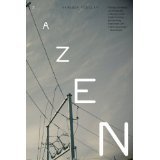
Every once in a while, the writer Jonathan Evison tells me about a book that he insists I have to read. Since I loved West of Here, and I adore him, and he's never been wrong before about a book, I always listen. This time he told me about Vanessa Veselka. Yup, he was right. Zazen is a haunting, brilliant, disturbing and very funny look at the world on the edge of collapse. I'm honored to have Vanessa here.
So, you've been a runaway, a sex worker and a musician. How and when did you know you wanted to be a writer?
I always kept journals so I always had the idea that things should be recorded. My first "book" was something I wrote when I was six. My dad and my stepmother packed everything they had into (and on top of) a VW Bug and drove my brother, a large shepherd mix dog, and me from New Jersey to Alaska camping in tents the whole way. I wrote about what I saw. Afterward they added pictures and turned it into a book. I still have a copy. What strikes me about it now is how deep my tendency toward darkness runs. I managed to get a little of the desperation of the moment on the page. They were going somewhere with nothing. And my aesthetic around language is similar to my work today. In the 'book' I quoted the line, "All set about with fever trees," twice. I looked it up. It comes from Kipling. I clearly heard it or read it somewhere and something about it hooked me and I couldn't let it go. I think I am much the same way today.
Through grade school I wrote. It was a survival skill. If I didn't do the reading I could be witty on paper. But I didn't write stories. It was "It was all snappy non-fiction, precocious and predictable.". But I got praise for it. I sold pieces to big magazines in my 20s and then somewhere around 28 I stopped. I couldn't stomach the voice I wrote in. It was all 'I know and you know but they don't know.' False intimacies of popular narrative designed to make everyone feel clever and mean nothing. I couldn't write after that and didn't until I was 36. When I started writing again, it was fiction. That's the great thing about the artistic mind. It's just like a child. It grows in its sleep. Zazen is so richly atmospheric, and so unsettling that at times, the effect is dizzying. Yet, you manage to meld very concrete details (tofu scrambler, for one) with the weirdness of more and more people gradually leaving the country and bombs gradually coming closer and closer. Do you feel this is where things are headed at all?
I don't know where the world is going to go. I try to fight off the darkest view, not because I'm worried about being too "negative" necessarily, but because that view may be incorrect. Zazen certainly inherited some of my darker views though, but I think the real fear for Della is uncertainty. She doesn't want to be a part of the world before she knows if it's going somewhere good. She doesn't want to watch. My personal guess is that the world is going to go to hell in a million places all at once and rebound in a million others at the same time. But I can't predict the overall arc. There's a big difference between not knowing because you want to remain ignorant so you can feel better, and not knowing because it's all more frighteningly creative, brilliant and deadly and glorious than you can track, and you really don't know.
What was it like to write Zazen? Who were your influences, or were there any?
It was like taking cheap, strychnine blotter every morning instead of vitamins for breakfast. It was electric and awful and riveting and felt better than anything I ever knew. My whole brain was engaged. I used everything. I felt like a single computer that could smoothly run an entire city, which is also to say it was a megalomaniacal state of extremes. And antisocial. It made me really boring company for over four years. That part is just wearing off. I think.
Influences? So many things affect my thoughts: Emma Goldman, Tolstoy, Neil Gaiman, Neil Young, Brian Eno, Led Zeppelin, Mother Jones, Melville, Devo, Dostoyevsky, Devo, Television (the band and the box), the Pali Canon, Conrad, Eliot (T.S., George, and Smith), Mercator maps, the Permo-Triassic extinction—I'm al over the place. The fire-bombing of Dresden. Sebald. Brad Neely.
What's your working/writing life like? Are you an outliner or a fly by the seat of your pen kind of writer?
What's my working/writing life like? Unsustainable and I do it anyway. Probably this is like most writers. I'm not going to get rich writing the kinds of books I like to write. I am too surly to be a copywriter, too dyslexic to be a copyeditor, too spiritually restless to work in communications—none of my talents cross over. I'm nearly unemployable. So it's always a struggle to support myself and write. But you do it anyway. Just like everyone else. Somehow.
I am a morning writer so I don't take jobs that cover that time. And I do 'fly by the seat' so I need large expanses of time to work my way into a world before I can effectively write in smaller, more convenient stretches. I probably missed my historical niche. I would have been great under a patronage system. Here's the deal, Veselka. Write me into all your novels as a benevolent force and I'll pay your rent and food. I'd sign right up. But then again, in the words of the great 18 century Haiku master Kobayashi Issa:Writing shit about new snow for the rich is not art. So what's a girl to do? I'm hoping some bookstore will hire me or someone will teach me a trade. What's your experience been like with Red Lemonade? I love the tagline "because the future of publishing starts with the writers."
I love Red Lemonade and I love Richard Nash. Going with any publisher is a gamble, but gambling on the smartest person you know is a good place to start. That way even if it doesn't work out, the conversation was better and you haven't spent three years with a jerk. Earnestly, though, I wouldn't be a part of Red Lemonade and Cursor if I didn't believe in its vision. There's more respect for writers in a way that makes sense. To borrow some playdate language, it's more consensual. My novel isn't "bad" because an agent or editor doesn't like it. It's just not for them. So there are two levels that kind of talk occurs on:1) A politically correct pass-off designed to sweep uncomfortable moments under a rug, 2) An actual, real, commentary on the situation, as in they are not your readers.And all you can ever ask for is that a novel finds its readers, its people. I feel like Red Lemonade allows for that in a more democratic way than a traditional publisher. And I think, in general, writers know more about who their readers would be than any editor. A business model that writers' aesthetic instincts as well as what they know about their audience is doomed. Hear that? DOOMED. Or at least very silly.
What's obsessing you now?
Finding a job so I can create enough stability to write the next novel. And the next novel.
What question didn't I ask that I should have asked?
The poet Crystal Williams raised the question recently (on facebook) of why white writers avoided writing about race. She thought they should. No interviewer has asked me about race yet, despite it being all over the novel. I think this is part of the "polite" white silence on the issue. The social discomfort many feel about not knowing how to enter the discussion. In Zazen, I let a lot of really problematic ideas about race run through. To my mind, I was exposing a particular kind of racism that many of us slip into and trying to satirize it. But recently I had a conversation with a very intelligent woman who felt that satirizing it was still giving it a pass. She wanted, I think, more of an overarching statement or maybe an aside about race. So for the record, I think if we dig deeply, every single person on this planet is racist at some level. We are prejudiced in a million ways, seen and unseen and we still have to figure out how to live together, get over it and be human. I don't believe in art as social curricula. I don't believe we, as Americans, close these gaps by covering them with paper or filling them with plaster. I was as shocked as anyone that I decided to write about race in Zazen. But in retrospect, maybe you can't really write an American novel without it. I'm sure I'm going too far with that. Oh well. It's my nature.
Published on May 25, 2011 11:38
Ted Krever talks about the Long Road to a Story
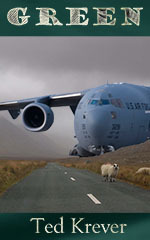
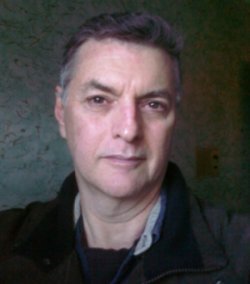 I'm giving over my blog to Ted Krever today, who is in the brave new world of ebook publishing. Thanks so much for being here, Ted!
I'm giving over my blog to Ted Krever today, who is in the brave new world of ebook publishing. Thanks so much for being here, Ted!Long Road to a Story
I have many female friends but one in particular became very close in the last ten years—we care deeply about each other, laugh at the same things, admire each other's gifts, know we can count on each other in good times and bad. We both got divorced around the same time. I found myself wondering: Why aren't we in love with each other? That would be so damn convenient!
When she invited me to Ireland, where she raises and trains horses, I took my laptop and made notes in character. Seeing the whole thing as fiction from the start freed me up—I followed different threads and details, got nervier and a bit more irresponsible. I actually had a bit more fun than I would have if I'd been me at the time.The nourishment in travel comes from the surprises. I'd never have known, without going, that you could stay in Ireland two or three days without meeting a single Irish person (back in 2004, the height of the Celtic Tiger). I would never have imagined the labyrinthine structure of Irish pubs—or the reason behind that structure. And it would never have occurred to me that this ancient culture was a far younger country than we are—grandparents today either remember the Irish Revolution or heard about it from their parents.
So I had a start. It took two other women to get me to the home stretch.The first I met for one date. She was obsessed with the torment of being beautiful—her every anecdote turned on this issue. My first reaction was 'we'd all love to have such problems', until I realized it really was a prison. Attractive women have a power they did nothing to create, can't control and know will wither far too soon. It's a corruption that's almost irresistible.
I met the other woman in NY the night before my second Irish trip, the following year. After eight exchanges of email the next day and twelve or so the next, I knew I'd met my soulmate, the person I'd waited for all my life. As soon as I said I was moving up my flight home to be with her, she decided she couldn't remember my face and wondered if we could possibly get along in the same room. And made sure, once I returned, that we couldn't.
It's harder to have your heart broken in middle-age. You don't expect the sting, you don't have forever to recover. But it left me with an ache I had to understand, to explain. So I wrote. It's the only way I come to understand anything.
They tell you as a writer that your job is to raise good questions. I surprised myself, after 16 drafts and almost nine years, by actually finding some answers.
On Smashwords (for e-readers other than Kindle): http://www.smashwords.com/books/view/56896
Published on May 25, 2011 11:29
May 23, 2011
Elizabeth Searle talks about life, art and Girl Held in Home
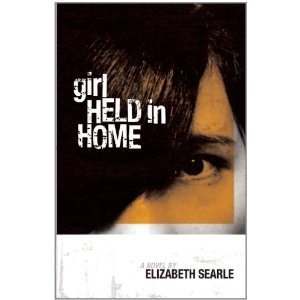
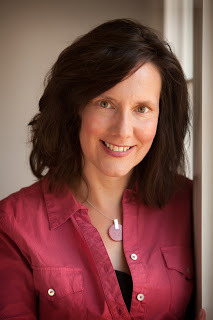 Elizabeth Searle is as warm and funny as she's talented. The author of four novels, including Celebrities in Disgrace, which was produced as a short film in 2010, as well as her forthcoming new novel, Girl Held in Home. Her novel, A Four-Sided Bed is being developed as a feature film. her theater works have drawn national media attention and her show, Tonya & Nancy, The Rock Opera, has had productions on both coasts. She teaches at Stonecoast in the MFA program. What really intrigued me is that she's been able to move from the world to fiction to the world of short film, so I asked her if she'd write about it.
Elizabeth Searle is as warm and funny as she's talented. The author of four novels, including Celebrities in Disgrace, which was produced as a short film in 2010, as well as her forthcoming new novel, Girl Held in Home. Her novel, A Four-Sided Bed is being developed as a feature film. her theater works have drawn national media attention and her show, Tonya & Nancy, The Rock Opera, has had productions on both coasts. She teaches at Stonecoast in the MFA program. What really intrigued me is that she's been able to move from the world to fiction to the world of short film, so I asked her if she'd write about it. Thanks to Caroline, a real star, for giving me this chance to talk about my ongoing adventure in the world of short film: an actual do-able 'way in' to movies for starstruck fiction writers.
Little did I know when my novella Celebrities in Disgrace was first 'optioned' back in 2005 that on a hot summer day in 2010, I would be gobbling M&Ms outside our 'closed set' while listening breathlessly to the heavy breaths of our film's talented stars Julian Brand and Patrice Bunch, as they brought a sex scene I'd written to passionate life. It was fascinating and a bit freaky to watch the scenes I'd imagined in my head so vividly performed.
The resulting film is CELEBRITIES IN DISGRACE, a fifteen minute glimpse of one aspiring actress's quest for her fifteen minutes of fame and of the troubled young man who gives it to her. It's produced by Bravo Sierra Pictures, an upstart film company whose motto is 'Micro Budget, Macro Attitude." The film premiered at the longrunning Woods Hole Film Festival on Cape Cod in August of 2010. Our 'short' was lucky to receive coverage on WBUR Boston and in the Boston Herald. The film was most recently accepted as an official selection of the Hoboken International Film Festival (with screenings in between in Las Vegas, Maine, Boston and Hollywood FirstGlance shorts competition, so far.
How did my little book, published by Graywolf Press, become a little film? While it took years to get the film made, I found that entering the world of film festivals is easier than my shy fellow scribes might think-- and can offer a chance to make fledgling film world connections. Festivals are open to the public, tickets are cheap and even the big-deal parties are crashable. (One tip on that is to hang out with members of the press, who might just let you tag along on their Press Passes!) At Nantucket Film Festival, I met producer Paul Boghosian of Harborside Films, who is now producing a theater work of mine. Through working on scripts for Harborside, I learned the basics of script writing. My Celebrities in Disgrace novella was first optioned by Seattle-based short-film maker Paul Ramsay, who I worked with in writing an initial version of the script. Unfortunately, the economy collapsed and his option lapsed.
Cut to 2009. As a teacher in the Stonecoast MFA program I was impressed by a scriptwriting seminar led by a student I had never worked with, Matthew Quinn Martin. Matthew already had a feature film to his credit: SLINGSHOT starring Julianna Margulies and David Arquette, released by the Weinstein Co. I told Matthew about Celebrities in Disgrace and he gamely took a look at the script.
Matthew helped me shape that initial script into a 15 minute version that focussed on the central sex scene from the novella which I'd often performed at readings, so I knew it had dramatic potential. In it, my aspiring actress character (who longs to play the role of Nancy Kerrigan, ice princess) 'acts out' the infamous Nancy knee-attack-- all while being filmed by a young 'fan' who has talked his way into her home. Mayhem and 'disgrace' ensue.
Once we had our script in hand, Matthew and his Bravo Sierra partner Mark McNutt raised funds and called in some favors to make a high quality film on a low budget, all at Mark's lovely home in Pennsylvania. I got to play the role of the 'bad mother' in blood-red lipstick, looking scary and coming across, Matthew told me, 'very David Lynch.' On the 'set,' I helped as best I could, mainly assisting in making lemonade for our sweaty hard-working stars and crew. Unlike many directors, Matthew-- as a writer himself-- welcomed me into the process. I felt I'd been magically thrown back to the days when my sister and I shot our own 'movies' on our family's ratchety Brownie camera.
I was teary-eyed weeks later at my first online viewing of the intense 2 minute Preview Matthew put together, which made me think in audience reflex: Hey I want to see that film. The filmmakers set me up on a Celebrities in Disgrace 'blog'. At our film festival premiere at Woods Hole, our film appeared with an especially well-matched set of shorts, including Alysia Reiner's accalimed Speed Grieving.
Now I am working with Matthew and Bravo Sierra to develop my novel A Four Sided Bed as feature film, and we're proud to have our short film getting our collective foot in the door and making its way around the festival circuit. I've noticed benefits to my fiction too. As I wrote my forthcoming novel, Girl Held In Home, my first book to be billed as a sort of 'literary thriller', I was mindful of what I'd learned about pacing and dialogue while writing scripts.
So fellow fiction writers, check out film festivals and indie film events near you. Withoutabox on Facebook makes submitting scripts or films easy. With luck and a bit of movie-mad moxxy, you will get to watch your own secret writerly vision come to life as a small film on the 'big screen.'
Published on May 23, 2011 09:25
May 20, 2011
Rochelle Jewell Shapiro talks about writing and Kaylee's Ghost
Rochelle Shapiro talks about writing and her new novel!
Published on May 20, 2011 08:23
May 17, 2011
Emma Straub talks about Other People We Married
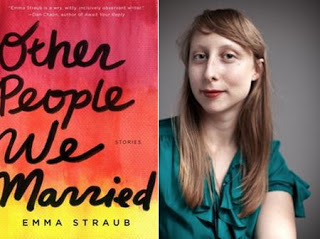
Emma Straub is frankly amazing. Her first novel Flyover State was named one of the best books of the year by the Courier Journal and just try to find someone who isn't raving about Other People We Married, her extraordinary collection of stories about love, loss, and the ties that bind and sometime strangle. She's also a bookseller at BookCourt and she runs a graphic company M. & E. with her husband. I'm thrilled she's here--thank you, Emma!
So, when did you know you wanted to be a writer? Were you encouraged?
I have always been horribly unsuited for most real jobs. After college, I worked as publicity assistant for six months, and that was the last time I had an office job. It's the pirate's life for me! My parents always encouraged me to do what made me happy, and because my father is a writer, they both understood this wacky endeavor. I think what's nice about having parents who really understand the publishing industry is that they're extremely well-informed about the entire process. They certainly understand it better than I do. That also means that they know the drawbacks and pitfalls and potential disasters better than most parents, which I suppose could have made them like those Hollywood parents I always read about, the ones who swear they won't let their children follow in their footsteps, but they remain my biggest supporters.
What's your writing life like?Oh, much like yours, I'm sure. I sit down, grunt at the computer screen, get up to find snacks, sit back down, grunt some more.
Some of the images in Other People We Married stopped me in my tracks, so much so that I had to underline them. The hair that was crashing like waves on a rocky shore, the pool that's like a giant eggplant. The stories are so funny and weird and filled with a uniquely quirky vision, and your characters very slowly unpeel like onions to reveal their deeper selves. So where do you think that vision came from? Why do you see the world the way you do?
You are so nice, Caroline. Thank you. I don't know why I see the world the way I do-- I'm sure it has to do with having parents who always told me stories, and found joy in making things up, and being a younger sister, and going to all the wonderful schools I went to, and having smart, funny friends, and finding the right husband, and all that. My voice on the page-- at least in these stories-- is very much me. I think if I wrote a book of essays, the voice would be much the same.
What's the new novel that's coming out about? Is it a departure from Other People We Married?
Indeed it is! The novel I'm working on-- Laura Lamont's Life in Pictures, which Riverhead is publishing in 2012--is a novel about a movie star in the Hollywood studio system. It starts in the 1930s and follows an actress for several decades of her life. It could not be more different than my stories. I think I needed a break from things that were so close to myself-- even the stories that are the farthest from my personal life could have happened to me, in some way, shape or form. I wanted some distance, and boy, did I get it. Hollywood! Historical fiction! Who knew? It's been a lot of fun to work on the book.
How has working at a bookstore impacted your writing life?
I read more than I did before, and I'm more aware of the marketplace. Honestly, I think every writer should work in a bookstore, at least for a little while. Even though I grew up knowing writers and editors and publishers, I never understood the role of the bookstore in the scope of the publishing world. I will be grateful to BookCourt for the rest of my life for letting me be a spy. (I mean, I do actually work, and sell books, and open boxes, and all that good stuff.)
What's obsessing you now?
The idea of free time. I've been working non-stop for the past couple of years, on writing and at the store, and at a host of other jobs, and though I am extremely, monumentally grateful for all the work I have at the moment, I am very much obsessed with the idea of a proper vacation. I don't know when such a thing will happen. I'm not very good at taking breaks. Unless of course I need a snack, in which case, I don't mind if I do.
What question didn't I ask that I should have?
You might have asked about the wonderful teachers I've had (Dan Chaon, Lorrie Moore, Jesse Lee Kercheval, Judy Mitchell), or if I've always liked to bake (yes), or which yoga poses I find physically impossible (crow, handstand), or how many hours I day I spend on Twitter (a thousand). Other than that, I think you covered it all! Cheers!
Published on May 17, 2011 15:17
May 16, 2011
Jennifer Haigh talks about FAITH
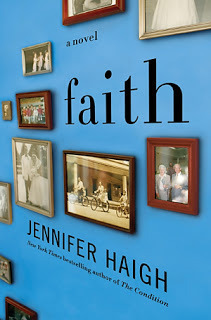
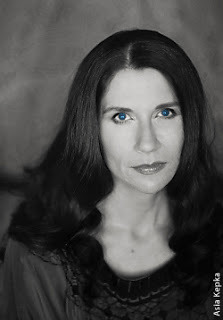
Jennifer Haigh has long been one of my favorite writers--and I have the dog-eared, oft-reread copies of Mrs. Kimble, Baker Towers and The Condition to prove it. Mrs Kimble won the 2004 Pen/Hemingway Award for debut fiction; Baker towers was a New York Times bestseller and won the 2006 Pen/L.L. Winship Award for an outstanding book by a New England author. Faith is an astonishing novel about family, loyalty, and what we choose to believe and why--and there is also a fascinating book trailer that goes along with it. Thank you so much, Jennifer, for being here.
Let's talk about the narrator in Faith. She's not sure what to believe about her brother, or her church. Why did you decide to have her be the one to tell the story?
I found Sheila's voice by accident. I'd never written a novel in the first person. I'd always considered it too limiting: in my experience, it's rare for any one character to know all the interesting parts of a story. But when I began reading about priests suspected of abusing children, I was struck by how difficult it is to get to the bottom of the story. There are never any witnesses. The only people who know the truth of the story are the priest and the child, and often neither will talk about it. The rest of us can only speculate about what went on behind closed doors. That's exactly what Sheila does in Faith. She's neither a devout Catholic nor an atheist. Instead she is a seeker, a person who's still figuring out what to believe.
On the surface, Faith is about sexual abuse and the priesthood, but it's really about so many more deeper issues about the faith we have in our clergy, in each other and in ourselves. It's also, to my mind, about connection and love. What's the backstory behind the writing of this novel?
Like a lot of writers, I write to make sense of the world, which sometimes means writing about things that disturb me. I moved to Boston from Iowa in 2002, just as the city was reeling from revelations that Catholic priests had molested children, and that the Archdiocese had covered up the abuse. Like everybody else, I was horrified. I was raised in a Catholic family, spent twelve years in parochial schools and had extremely fond memories of my interactions with Catholic clergy. It's no exaggeration to say that nuns and priests were the heroes of my childhood. As I read about what had happened in Boston, I found it impossible to square it with those tender memories of my Catholic childhood. Faith was my attempt to explain the inexplicable, to understand what I couldn't make sense of in any other way.
Without giving anything away, what I loved was how often expectations were reversed. I thought I knew where the story was going, and it almost always veered in another direction. How carefully do you map out where you want to go? When you started writing this novel, did you know whether you wanted Art to be guilty or innocent?
I wanted Art to be innocent, but suspected he might be guilty. Like Sheila, I figured it out gradually. All of the surprising events in the story were surprises to me too. I never write with a fixed idea of how the story will end. The suspense is what keeps me going. Basically, I write novels for the same reason I read them: to find out what happens next.
What was the writing of Faith like? Your last novel, The Condition, was this wonderful expansive novel, but Faith seems leaner and tighter on some levels. Was this a deliberate choice?
Not deliberate – it came about organically, probably as a result of writing in the first person. The Condition is told from multiple points of view; and the same event is often seen through different characters' eyes. The story lies in the contrast: how differently Paulette and her ex-husband remember their marriage, for example. In Faith everything is filtered through Sheila. There's none of that interplay between perspectives, and the result is a tighter structure. We are limited by what she knows and what she understands.
What's obsessing you now in your work?
I'm nearly finished with a collection of short stories I've been working on for seven years. They're all set in Bakerton, the western Pennsylvania coal town where my second novel, Baker Towers, takes place. A few of the characters from Baker Towers actually reappear: Miss Peale, the schoolmistress; Joyce Novak and her mysterious younger brother Sandy, who runs off to California and is rarely seen again. Readers have been asking me for years what became of Sandy Novak. The story collection will finally answer that question.
Published on May 16, 2011 12:46
May 12, 2011
Thelma Adams talks about writing and Playdate
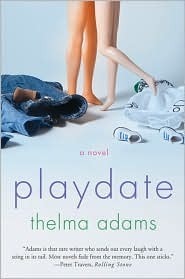
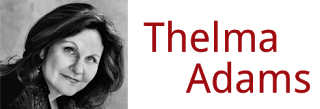
Thelma Adams has been the film critic at US Weekly since 2000, following six years at the New York Post. Her work has appeared in The New York Times Magazine, O: The Oprah magazine, The Huffington Post, Marie Claire, the New York Times, and more. Her debut novel, Playdate, is an Oprah pick, and I'm honored to have her hear on my blog. Thanks, Thelma!
As a former tortoise owner myself, I was in love with the box turtle in the book. Why a turtle in the book?
When we first lived together in Chelsea, my husband always had turtles. He is a turtle-lover, and we have a very turtle-and-the-hare relationship. (I'm the rabbit, always leaping.) What this means is that I spent a lot of time with turtles – red-eared sliders, box, but nothing bigger than a breadbox. We had an Asian Box Turtle that we named Buckethead. And, amazingly, if we played Stevie Winwood's "Higher Love" the turtle would actually dance, moving his bucket head back and forth to the music. Because of that, we played "Higher Love" a lot. Now, we live in the country, and there's an ancient one-eyed snapping turtle that lives in our stream. We've named her Cyclops. She doesn't dance that we know of, but she does lay eggs. We're very protective of her without getting very close.
But why a turtle in the book? Because, as clever as they are, you can't get affection from a turtle the way you can from a cat or a dog; they don't hop onto the bed and curl up beside you. Belle, the daughter in the book, wants that connection from a pet, the uncritical affection. And it just wasn't going to come from "Boxy," or even from the mother that allowed her to get a turtle, but said "no" to a puppy.
The wildly comic ride of your novel's been compared to Little Children, but where would you say your inspiration lies?
My inspiration lies in P. G. Wodehouse and Evelyn Waugh (think Scoop), in creating a surface lightness in dialog that belies the darkness, or the complications, beneath. Or acknowledges the darkness playfully, with a sting, like the Jewish humor I grew up with – The Marx Brothers, Woody Allen, Mel Brooks (think his wonderful song and dance "The Inquisition"). The fiction writer Paula Bomer compared Playdate to Philip Roth's Portnoy's Complaint, and I liked that, and felt honored by the comparison, because Roth's early writing was sexy, funny, and painfully honest. He broke new ground.
I loved the whole backdrop of the wildfire, which gave your novel this incredible cinematic quality, which brings me to your job as film critic for Us Weekly. Does being a novelist inform being a film critic and vice versa?
It runs both ways. As a critic, I think I always look at story first. Does the script deliver? Does the dialog pop? Are we moved to laughter or tears? Does it have narrative drive? And, as a creative writer myself, I also recognize that the movie is an artistic collaboration, and even the worst movie was somebody's baby at one point.
On the other hand, the first kernel of this project started as a script idea: a cross between "Shampoo" and "Mr. Mom." But then I realized that I knew nothing about writing scripts, and it was an entirely different skill set. So I fell back to what I knew and wrote a book. In "Shampoo," the movie is set against the backdrop of an election. I wanted this book to be set against the backdrop of a larger event. Enter the fires. But it wasn't until a much later revise, after the Witch Creek Fires, that the Santa Ana winds became a much larger determining force in the book.
In the final draft of my novel, my editor Katie Gilligan at St. Martins/Thomas Dunne Books pointed out all my cinematic transitions that began chapters – meanwhile, over at the playground – and suggested (only suggested) I try another way in. I hadn't realized that I was doing that, that I was wasting an opportunity to go deeper at the beginning of chapters, and I appreciated her fresh eyes. And dug deeper.
From the "playground fabulousness" to the kiddie diner with gourmet food, you skewer the pretentions of upper class suburbia with gleeful aplomb. Do you think there's a solution for this kind of living?
Yes. Love your children and don't turn them into status objects. In my book, I call it the Disneyland Syndrome – the misconception that if you take the kids to a theme park, and buy them every thing they want, and go on every ride, they will remember that as their childhood. Childhood is also in the rest between beats. It doesn't take any money to have a real connection with your kid, just an open heart and a willingness to listen to them, really listen.
Tell us what your daily writing life is like?Because I'm a film critic, and movies get scheduled on a very short lead time that the studios control, every day is different. Two or three days a week, I take Metro North to NYC to see movies. Seeing new movies remains a pleasure for me, and I think always will be. I love that moment when the lights come down in the theater, and the screen lights up. But my schedule's unpredictability makes it hard to get a fiction-writing routine together. And I love a writing rut. I'm a morning writer, and write best in a few compact hours of very high concentration, without internet if I can control myself. What I'm trying to do now is string together three or four or five days running – including weekends – when I can get my head in the novel and keep it there. Writing for Us Weekly always comes first, and interviews for Marie Claire. That's how I pay my way, and it's a lovely way to do it.
The biggest break for my writing life (after publishing my first novel) just happened: after years of putting my kids on the school bus and getting them ready, my son is now at boarding school and my daughter suddenly this week began to get up and dressed and out the door by herself. That means when I wake up, I can just caffeinate and go without the distractions of lost homework, missing socks, sleepy children and scraping ice off the windshield.
What's obsessing you now?
My next book. I'm writing a novel about Upstate New York mothers. I have an outline, and a string of incidents, and I'm trying to get it to cohere. Really, I'm just trying to write from beginning to end to see what I have without judging it along the way.
When you've completed a book, there's a tendency to see it as a finished product, and forget all the many, many drafts that got it there. So, it can be a challenge to start afresh, and write through the crap, and the indecision, so that later you can cut back and dive deeper and play with the prose. It's a marathon – and it helps to have marathon buddies to remind you that the large overwhelming project is put together in a string of days spent with your butt in the chair and your fingers racing. And that every day you get your butt in that desk chair, every 500 words chipped away, is a small triumph.
What do you wish you knew five years ago?
That I would get a novel published. Whew! If I had known that five years ago, I could have discarded all the time spent and wasted worrying that I was writing fiction into the void, rather than taking the kids to sports activities or getting my house in order or just plain chillaxing.
And, secondly, that even though my wish would come true, that I would publish a novel, life would go on with all its ups and downs, births and deaths. Becoming a published novelist wouldn't change every thing like a magic pill, and it would even create some new problems. But nothing could knock the giddy happy feeling to see my hard work realized: my book in print and lined up with its gorgeous blue cover beside my desk; and strangers across the country (Ok, mostly in NY and LA) laughing at my jokes, and seeing the world through my eyes.
Published on May 12, 2011 08:04
May 6, 2011
Sheila Weller Talks about Girls Like Us, the MOVIE!
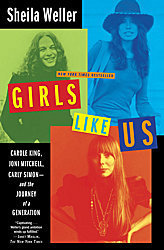

Didn't you just love Girls Like Us, the groundbreaking bio of Carole King, Joni Mitchell and Carly Simon? Exuberantly told, this book explored the lives of three of music's most important women in a way that was so irresistible that I was carrying around my copy until it was dog-eared. Sheila Weller is equally amazing. The writer of six books, two of them New York Times bestsellers, she also writes about social history for Vanity Fair and is a contributing editor at Glamour. Plus, frankly, she's one of the coolest and most interesting people I know. Thanks so much for being here on my blog, Sheila.
I absolutely adored Girls Like Us. The women in the book were such heroines to so many of us. I've read that the book is now going to be a film. Will Joni, Carole or Carly be a part of that at all?
Caroline, thank you so much! I am so gratified by the nerve the book seems to have struck. As someone who has been a writer since --- well, forever (I've never done anything else!)..., this was the thing I did that I want on my tombstone. I often say, "I wrote a family memoir, but this book is even more autobiographical than the memoir." Because I used Carole's, Joni's and Carly's lives and songs to probe the common journey so many of us took -- the women of the '60s generation.
As to your question: The producers and the studio will certainly want to use their songs, so, yes, the three women (or at least their representatives) will be a part of the process. I hope everything goes happily and smoothly in that regard. It's certainly an opportunity for these amazing icons to be deeply known to younger generations. When you think about it (and I do think about this...), it's still (sigh) the guys who are "ageless" and the women who are..."older." Paul McCartney plays to rave audiences of kids in their 20s, and President Obama and his wife and the entire Kennedy Center sang along with him to "Hey Jude" to bring the last Kennedy Center Honors to a raving close. Keith Richards had a critically and commercially acclaimed $7 million # 1 bestseller memoir. (And Eric Clapton a few years before.) James Taylor (the "boy" among my girls) just got a prestigious medal of honor from the president, performed at the inauguration, just played Carnegie Hall to unbelievable reviews, and, in the documentary -- Troubadours -- in which he and Carole were featured, it was he who was hagiographed. Then there's Bruce, Mick and Sting. Not to mention Dylan! Yet these three women are absolutely every bit as significant -- and beloved. And, in turning the big ship of the culture and in taking personal risks to create, they did, and risked, more than the guys! (How easy was it to be a rock n roll star-and-songwriter in the '60s and '70s and have loving, supportive girlfriends who made your life easy? VERY. How easy to be a -- well, just switch the gender and answer the question.) So I'm so very excited that the book will be a movie, and that the movie will bring their magic, their guts, and their beautiful, culture-defining music music to younger people who don't know them well, and who, apart from Mad Men, didn't know how young women had to stumble and then push through in some pretty emotionally and socially crimped circumstances.
I want people who weren't even born when they were creating Blue and Tapestry and "You're So Vain" (and we're talking 39 and 40 years ago) to walk out of the theater singing their songs, and appreciating those songs' triumphs and costs.
Whom do you envision playing each--if you had your druthers?
Well, of course, next to goofing around on Facebook and checking my Amazon numbers, what is more obsessive fun than "casting" this movie?! I've had a lot of different casting ideas, but here is what I've settled on and I'm sticking to it. (Please understand: I have absolutely NO say in the casting. NONE. Nada, zip.) But, anyway:
As Carole: Michelle Williams. She has a gravity, a solemnity, which was an ineffable part of Carole's resonance and appeal. Like Carole (who was a wife to a difficult, haunted, talented guy, Gerry Goffin; a mother, and a bill-paying # 1 hit writer before she was out of her teens), sensible, older-than-her-years Michelle's love affair with the haunted and excess-prone Heath Ledger left her young with a child when he tragically died -- and wiser and more responsible than her years. She wears that quality of premature adulthood; you can't miss it in her. She's a terrific actress, and doesn't play characters who suffer fools lightly (because she doesn't seem to in real life). When she is shocked by her own naivete and heartbroken (to wit, the scene in Brokeback Mountain when she understands that her husband is gay), she never seems shnookered or should-have-known-better. We are on her side with her broken heart. As it was with Carole, whose love choices were often the Achilles Heel of her otherwise prematurely mature decision making and competence, Williams has an easily-empathized-with dignity, in her life and her movie roles, that makes us take her side. She is never frivolous.
I just -- dearly! -- hope she can play a piano, and really play it. Because, more than voice, that's what Carole is and did and does. Piano -- gospel piano pounding -- is her first language.
As Joni: Taylor Swift. Taylor Swift is a huge star among young audiences, and, having just moved to Beverly Hills, she is obviously working hard to turn her music stardom into a film equivalent. Like Joni, she has written famously guessed-about songs about her boyfriends. She is tall, lean, feminine, projects charisma/exhibitionism AND shy, ladylike decorousness...that was Joni in the mid-late '60s and even early 70s. Joni is the easiest to cast, in that, as complicated as she was and is (and, man!, she was and is), on first interpretation, she fills the archetype of the lovely, sensitive, long-blond-haired girl singer (Maybe because she created that archetype), so "indication" of that now-well-understood type goes a long way; the idioysyncracies can be filled in. There are more obvious Joni's than Caroles or Carlys among young actresses today. (Amanda Seyfried, Mia Wiakowska, Jennifer Lawrence, etc.) I'd like Taylor Swift -- a superstar and a lovely girl -- to embrace her Inner Joni (and what girl singer doesn;t have one?), take a ton of acting classes, and run with it, providing the highest-glow wattage for the ensemble, which will shine over the whole project. And, for those who say: But Taylor Swift's a country singer..., well, she's actually from Pennsylvania.
As Carly: Evan Rachel Wood. Carly, in my mind, was always the hardest to cast. For Carly, one needs a long, lean, strong-featured actress who can sing really well (Carly has the classically best voice of the three) and who oozes sexuality, wit, and a certain wacky, highly privileged, genially neurotic, predatory mischievousness. Three things qualify Evan Rachel Wood for this unique mix of prerequisites: (1) her singing in Across the Universe; (2) her years with Marilyn Manson (high points, Evan, for relishing the public's "ewww"-ing of that unexpected love affair). And (3) her a-fucking-mazing performance as Veda (the snooty, scheming, sex goddess daughter from hell) in Mildred Pierce. Case closed.
The book tied together these three lives so brilliantly, but I'm wondering if the film will be structured differently?
Thank you. I think they want to keep the alternating, layer-like quality of the book, where the stories are woven together. The producer-director, Katie Jacobs (the showrunner and often-director of TV's often Emmy nominated and hugely successful House) was give the book, shortly after it came out, by her sister, MIT History professor Meg Jacobs. So, from the first, she saw it as social history, not just entertainment. So does Amy Pascal, the co-head of Sony-Columbia Pictures, who is overseeing its production at the studio. The third in the production team is Lorenzo Di Bonaventura. (Lorenzo is one of the most accomplished and successful producers in Hollywood. When you saw the red-carpet pictures of Angelina Jolie at the Salt premiere and there was this...unknown but self-possessed big guy...in the picture with her -- just the two of them: that was Lorenzo.)
But I'm most excited about the selection of John Sayles to do the adaptation. Aside from being the original American auteur and the most respected, puts-his-money-where-his-mouth-is independent filmmakers in the country, he has such a deep, personally experienced sense of and respect for the '60s and '70s (among many other things, his Return of the Secaucus Seven was the template not only for The Big Chill...but, in a very real sense, for Carole's Tapestry circle of friends; and he did girls-at-[Carly's]-Sarah Lawrence in Baby It's You). And his work -- films and novels (by the way, he has a huge historical novel coming out...now) -- is invariably about the intersection of social-cultural moments with complex human beings who let us see, and sympathize with, all sides of their dilemmas and choices. I'm thrilled that he is adapting. Thrilled and honored.
How involved in the filmmaking process are you and has it been any sort of revelation for you? Does it feel like a new story you are telling now?
I don't think I'm going to be very involved, alas. Sayles, Jacobs, DiBonaventura, and Amy Pascal:They're all real pros, the top of their fields -- they know how to make movies. It's up to them to consult me if they want or need. They know where to find me -- and: I'm pushy, so if things go too long without me being consulted, I'll find a way to knock on that door. Happily, I'm secure -- and they're secure --- with the fact that I did so much original, source- attributed journalism on these women's lives, we have that part under control. ("Life rights" permission/acqusition for "public figures" has a legally lower bar than for non-public figures.) (Music rights: now, that's are another issue... and I will breathe a sigh of relief once that's taken care of.)
Do you think there's an appetite for this movie?
This may sound self-aggrandizing but...I really do. There was a magic, sexiness, integrity, and historical significance about that era and these women and their music that hasn't really been tapped. (Lisa Chodolenko's Laurel Canyon didn't have the expected magic. Todd Haynes's I'm Not There was too abstract. In its own way, I think Factory Girl came close, but critics unfairly panned it. For my money, Across The Universe hit it out of the park, but the young people in the audience I saw it with made snarky remarks while I nostalgically sobbed.) When we lift the veil here and there and see bits and pieces of the specialness of that time -- in Carole's and James's phenomenally successful summer 2010 concert tour, for example -- it's like, "Why have we been deprived of this for so long??" When a great musician biopic comes along -- Walk the Line or Ray -- it's an emotional experience like little else; it's a high. If that movie presents not just an era and a rise to success, but also real characters the audience can approvingly root for (and, unlike Ray Charles and Johnny Cash, these women were non-drug-abusing, consistently productive middle class girls) -- then that's an added bit of popcorn power.
As I said, I think people will walk out of the theater singing.Now: We just have to get to that part!Thanks so much for talking to me, Caroline. Readers can visit my book's website -- www.girlslikeusthebook.com -- and / or its companion music / media site:www.girlslikeusthemusic.com
Published on May 06, 2011 06:54
May 5, 2011
Jon Papernick talks about innovative book selling, bold writing, and fame
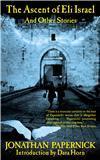
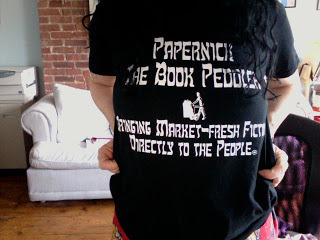
Jon Papernick is a total original. I met him at one of my readings and he handed me his book, There is No Other, and asked if I would blurb it. That night I started to read and I was completely knocked out. Words like genius floated in my head. ( i said: "Surprising, shocking, profane and hilarious.") I got back in touch with him immediately and we've become, I'm happy to say, friends. I have a vested interest in his work--which I think is unlike anything I've ever read before. Plus, he's a swell, funny guy. And The Ascent of Eli Israel, which garnered raves from the NYT and more, is just brilliant. The cool Papernick The Book Peddler t-shirt (thanks, Jon! I wear it proudly, even over my pajamas, as you can see!) is part of his innovative marketing, where he indeed peddles his book from a pushcart.
Thanks so much Jon for coming on my blog--and many thanks for the way cool t-shirt!
You've been compared (and rightly so) to Nathan Englander and Bernard Malamud. The Ascent of Eli Israel is being reissued after ten years, with raves from everyone from the NYT to the Washington Post Book World. Indeed, the book is weird and wired, breathtaking and bold, as it limns modern day Israel and the lives of Jews and Muslims. So I want to ask, how do you see these stories differently now than you did a decade ago? What's changed?
I do see the stories very differently than I did a decade ago since I seem to have hardened into something really permanent. When the book was first published I could remember writing every line and how I came to it, whereas now I almost feel that these stories were written by somebody else, something far, far wiser than me. I really wrote those stories to try and sort out my feelings about the Palestinian/Israeli conflict after living there and working as a journalist for year. None of the stories provide any answers, even after all this time, but I think they provide plenty of questions, and I think that is what good literature should be all about. Interestingly, I wrote most of the stories in 1998 in 1999 when it was sacrilege to even discuss the possibility that the Oslo Peace Accords would fail. It's easy to forget that for a few dizzying years, peace between Israel and the Palestinians and her neighbors seemed to be a fait accompli. I was writing about a collapse that had not yet happened.
People in your extraordinary stories are always pushing the boundaries: A man brings a barely dressed young woman into a religious neighborhood, a man desperate to protect himself kills a young boy. But despite the stunning shocks here, there's an incredible compassion and hope in your stories. How do you think people tap and/or find that compassion?
I think people find compassion when they are given the opportunity to know someone intimately. People are naturally less inclined to look with empathy upon strangers, people alien to their experience. That is why think good literature is so important, as it has a great humanizing effect, allowing the reader to walk in the shoes of somebody in a drastically different situation than herself. I write not to prove what I know, but to know what I don't know, and I found that characters based on the types of people that I might not have empathized with became more and more sympathetic for me the more I knew them. Ultimately, I came to love all of my characters, and I think a writer needs to respect his characters deeply in order for a reader to care about their fates.
Can you talk about your writing process? And what are you working on now?
My writing process lately has been extremely sporadic as I'm teaching full-time at Emerson college and have two very small, cute and demanding children. But, the semester is just coming to an end and I have two months to get as much writing done as possible before my summer job begins. I would like to get 100 pages done by July 1 if possible, but of late, I've become quite entranced by Twitter (feel free to follow me at @JonPapernick). As far as process, I usually write by hand, unreadable hand, even to my own trained eyes, and then I dictate what I've done through Dragon NaturallySpeaking. So, really old school and really new school. I am working on a novel entitled The Sunday Synagogue Softball League, which centers around the players on a softball team whose Synagogue has gone bankrupt after losing their money to Bernie Madoff. I don't want to say too much, but hopefully I'll be able to send you a copy before too long.
Tell us about the ingenious creation of Papernick the Book Peddler. How did this come about? How have people been responding? Were you surprised by all the media attention or did this seem like an idea whose time has come?
The idea of Papernick the Book Peddler came about almost as a joke, the way that most of my best ideas arise. But, I think this idea speaks to writers who pull out their hair every time they see their Amazon.com ratings, something I have been guilty of, and instead puts control back in the writer's hands. I was tired of not being noticed, and I wanted to take my books directly to the people, find my own readership without any intermediary or middleman. I've gotten great reviews in the past, but it doesn't always translate into sales, and I want to define my own success by taking some control over getting my books into people's hands. Overall, people have been responding very positively, and I've certainly sold more books than I would've sold otherwise. We'll see how it goes this summer, but I plan on continuing this as long as I'm having fun [and as long as the weather is good]. I wasn't surprised by the media attention because I think this is a really interesting story since it is a very counterintuitive way to sell books consider living in the age of the Kindle and other e-book formats. However, people who love books will always appreciate holding a book in their hand and meeting the author face-to-face. I would love to have the New York Times pick up this story. This seems like the kind of story that I would read in the Sunday Times. So, my fingers are crossed for now.
What question didn't I ask that I should have?
I'm not sure if you asked me this question on the record or off the record, but you said you were astounded that I was not famous, and that makes me smile. I can't speak to the vicissitudes of the publishing world, but I do believe if you do good work and if you hang around long enough, people will find the books that they need to read. As far as being famous, I'm not too concerned about that, but I would like to reach a level of name recognition in which new opportunities may arise that I haven't up to now have access to.
Published on May 05, 2011 07:52



